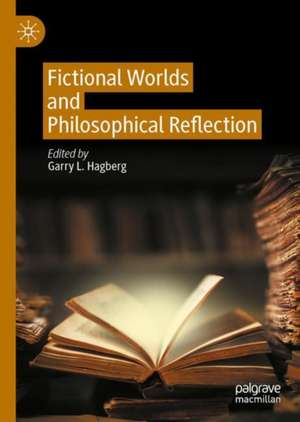Fictional Worlds and Philosophical Reflection
Editat de Garry Hagbergen Limba Engleză Hardback – feb 2022
| Toate formatele și edițiile | Preț | Express |
|---|---|---|
| Paperback (1) | 894.09 lei 6-8 săpt. | |
| Springer International Publishing – 2 feb 2023 | 894.09 lei 6-8 săpt. | |
| Hardback (1) | 898.40 lei 6-8 săpt. | |
| Springer International Publishing – feb 2022 | 898.40 lei 6-8 săpt. |
Preț: 898.40 lei
Preț vechi: 1095.61 lei
-18% Nou
Puncte Express: 1348
Preț estimativ în valută:
171.95€ • 177.21$ • 145.17£
171.95€ • 177.21$ • 145.17£
Carte tipărită la comandă
Livrare economică 03-17 martie
Preluare comenzi: 021 569.72.76
Specificații
ISBN-13: 9783030730604
ISBN-10: 3030730603
Pagini: 437
Ilustrații: XXV, 379 p. 5 illus.
Dimensiuni: 148 x 210 mm
Greutate: 0.66 kg
Ediția:1st ed. 2022
Editura: Springer International Publishing
Colecția Palgrave Macmillan
Locul publicării:Cham, Switzerland
ISBN-10: 3030730603
Pagini: 437
Ilustrații: XXV, 379 p. 5 illus.
Dimensiuni: 148 x 210 mm
Greutate: 0.66 kg
Ediția:1st ed. 2022
Editura: Springer International Publishing
Colecția Palgrave Macmillan
Locul publicării:Cham, Switzerland
Cuprins
1. Introduction: Philosophical Thinking in a Fictional World; Garry L. Hagberg.- 2. 1. The Possibility of the Philosophical Novel as a Genre; Michael H. Mitias.- 3. 2. Narrative and the Value of Falsehood: An Approach to Fiction; David Gorman.- 4. 3. Learning to Read: A Problem for Adam Smith and a Solution from Jane Austen; Lauren Kopajtic.- 5. 4. Philosophy and Literature in Jorge Luis Borges: Aliados o Enemigos?; José Luis Fernández.- 6. 5. Metaphors We Live, Worlds We Read; James Nikopoulos.- 7. 6. Oneself as Character: Emplotment, Memory, and Metaphor in Ricoeur, Bakhtin and Nabokov’s The Gift; Leonid Bilmes.- 8. 7. Sherlockismus: Freud and the Romance of Detection; Stewart Justman.- 9. 8. Extrahuman Transcendence in Oscar Wilde’s The Picture of Dorian Gray; Katie Fry.- 10. 9. A Nietzschean Wuthering Heights?; Charles Nussbaum.-
11. 10. Wordsworth’s Literary Sublime; Katherine Elkins.- 12. 11. Searching for Chad, He Found Himself: Peirce, Wittgenstein, Pragmatism, and the Case of Lambert Strether in Henry James’s The Ambassadors; Garry L. Hagberg.- 13. 12. The Passing Away of the Past: The Transmutation of Modernism into Postmodernism; Rizwan Saeed Ahmed & Akhtar Aziz.- 14. 13. Spiritual Idealism and Tragic Wisdom: An Essay on King Lear; Robert Baker.- 15. 14. Sense and Conscience: Hunting for Certainty in Hamlet; Charlie Gustafson-Barrett.-
Notă biografică
Garry L. Hagberg is the James H. Ottaway Professor of Philosophy and Aesthetics at Bard College, USA. Author of numerous books and articles at the intersection of the philosophy of the arts and the philosophy of language and Editor of the journal Philosophy and Literature, his most recent books are Describing Ourselves: Wittgenstein and Autobiographical Consciousness (2008) and Living in Words: Literature, Autobiographical Language, and the Composition of Selfhood (forthcoming). Previous edited volumes include Wittgenstein on Aesthetic Understanding (2017), Stanley Cavell on Aesthetic Understanding (2018), Narrative and Self-Understanding (2019), and Fictional Worlds and the Moral Imagination (2020).
Textul de pe ultima copertă
This edited collection investigates the kinds of philosophical reflection we can undertake in the imaginative worlds of literature. Opening with a look into the relations between philosophical thought and literary interpretation, the volume proceeds through absorbing discussions of the ways we can see life through the lens of literature, the relations between philosophical saying and literary showing, and some ways we can see the literary past philosophically and assess its significance for the present. Taken as a whole, the volume shows how imagined contexts can be a source of knowledge, a source of conceptual clarification, and a source of insight and understanding. And because philosophical thinking is undertaken, after all, in words, a heightened sensitivity to the precise employments of our words – particularly philosophically central words such as truth, reality, perception, knowledge, selfhood, illusion, understanding, falsehood – can bring a clarity and a refreshed sense of the life that our words take on in fully-described contexts of usage. And in these imagined contexts we can also see more acutely and deeply into the meaning of words about words – metaphor and figurative tropes, verbal coherence, intelligibility, implication, sense, and indeed the word “meaning” itself. Moving from a philosophical issue into a literary world in which the central concepts of that issue are in play can thus enrich our comprehension of those concepts and, in the strongest cases, substantively change the way we see them. With a combination of conceptual acuity and literary sensitivity, this volume maps out some of the territory that philosophical reflection and literary engagement share.
Caracteristici
Deepens our understanding of the interrelations between philosophical thinking and literary experience Shows how we can see life through the lens of literature Investigates how it is that we draw understanding from the literature of the past
